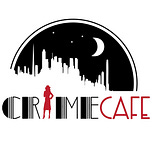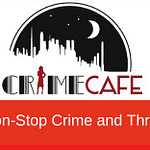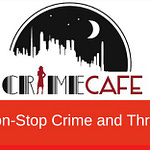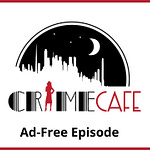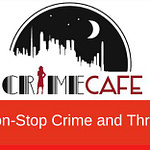Subscribe: Apple Podcasts | Google Podcasts | Spotify | Stitcher | Blubrry | Email | TuneIn | RSS | More
Debbi Mack interviews crime writer Rea Frey.
This is the Crime Cafe, your podcasting source of great crime, suspense and thriller writing. I’m your host Debbi Mack. Before I bring on my guest, I’ll just remind you that the Crime Cafe has two eBooks for sale: the nine book box set and the short story anthology. You can find the buy inks for both on my website, debbimack.com under the Crime Cafe link. You can also get a free copy of either book if you become a Patreon supporter. You’ll get that and much more if you support the podcast on Patreon, along with our eternal gratitude for doing so.
Check us out on Patreon: https://www.patreon.com/crimecafe
Debbi (00:54): But first, let me put in a good word for Blubrry podcasting.
I’m a Blubrry affiliate, but that’s not the only reason I’m telling you this. I’ve been using Blubrry Podcasting as my hosting service for my podcast for years and it’s one of the best decisions I ever made. They give great customer service, you’re in complete control of your own podcast, you can run it from your own website, and it just takes a lot of the work out of podcasting for me. I find for that reason that it’s a company that I can get behind 100% and say, “You should try this.” Try Blubrry. It doesn’t require a long-term contract, and it’s just a great company, period. It also has free technical support by email, video, and phone, so you can get a human being there. Isn’t that nice?
If you want to podcast, try out Blubrry. No long-term contract, excellent distribution, and great technical support, too, by email, video, and on the phone. I’ve included an affiliate link on this blog.
Here’s a link to a PDF copy of the interview.
Debbi: Hi, everyone. My guest today is the author of several novels, as well as the CEO and founder of Writeway, where basically you get to learn about the publishing industry before you get into this crazy business. Let’s see. She lives in Nashville with her husband, daughter, and three wild animals. We’ll have to talk about the wild animals too. I’m pleased introduce my guest, Rea Frey. Hi, Rea.
Rea: Hello.
Debbi: It’s so good to have you here.
Rea: It’s so nice to be here. Thanks for having me.
Debbi: Sure thing. I got to say, I love your website so much. It’s so clever and pretty. And I like the photo on the homepage with you holding those books that are dripping paint or something.
Rea: Yeah.
Debbi: I mean, it seems to be a metaphor of some kind.
Rea: Yes, we could say it’s a metaphor for so many different things, but yeah, it was a fun site to put together.
Debbi: Yeah. Yeah. It’s great. It’s wonderful. I like it. And I like the idea of your show, your podcast, but we’ll get into that in a second.
Debbi: Tell us first about your books. How would you describe your writing? Is it domestic suspense, thriller?
Rea: Yeah. It’s domestic suspense, which, in all honesty, when my debut novel came out, Not Her Daughter, and they told me I was in the domestic suspense genre, I was like, “What is that? What is domestic suspense?” I wasn’t aiming to write in a genre, but I always like to say I write things that basically scare the shit out of parents. I love to kind of take that worst case scenario, because I’m a parent, and really play out those fears, whether it’s kidnapping, a guardian dies, someone disappears. I love playing with that and playing with morality a little bit. So I’m definitely more relationship-based instead of, you know, straight thrillers, but I technically do fall in that domestic suspense category.
I wasn’t aiming to write in a genre, but I always like to say I write things that basically scare the shit out of parents. I love to kind of take that worst case scenario, because I’m a parent, and really play out those fears, whether it’s kidnapping, a guardian dies, someone disappears. I love playing with that and playing with morality a little bit.
Debbi: Okay. Well, you know, so people understand what it is you write, it’s a convenient label, right?
Rea: Yep. It is a convenient label, yes.
Debbi: Are all your books standalones?
Rea: Yes, they are. You know, my first one, again, my debut, Not Her Daughter, was supposed to be a sequel, and one publisher wanted the standalone, which is who I went with, St. Martin’s Press, because I wanted the clout of the “Big Five” behind me, and then the other publisher was more of kind of a niche publisher. They were great, but they wanted me to have the sequel. They wanted me to be a lead title, they wanted to do the hardback book. And I was very romanced by going with the big boys.
Rea: So I did that. And as a result, yeah, I got a four-book deal and they were all standalones. And after that first book, I was like, “Well, I don’t know what I’m going to write.” This debut just fell out. I mean, I wrote it so fast. And every subsequent book, I was like, “Okay, now what, now what, now what?”
Rea: So it was an interesting experience. It didn’t quite flow like the first book, but it was all so fun and such a learning experience, that’s for sure.
Debbi: Mm-hmm (affirmative). Yeah. So have you ever even considered writing a series?
Rea: You know, that’s a great question. I mean, yes. With Not Her Daughter, I actually went ahead and kind of worked on a sequel because that book really felt unfinished to me. But besides that, I feel like when I am done with a book, I’m very much like a screenwriter, when I’m done, I’m like, “Great. Onto the next project.” I never want to think about the book again. I never even want to look at it again. So I think to stay with those characters book after book would be a challenge for me personally.
Debbi: Mm-hmm (affirmative). And just so you know, I do screenwriting, and screenwriting is a whole lot of rewriting.
Rea: Yes.
Debbi: A whole lot of [crosstalk 00:05:01].
Rea: A whole lot of rewriting, but I love, when you are done, if you’re ever really done, you’re not responsible, like with a book, you know, having the book launch and doing the tour and doing all of these things. It’s like boom, it can be out, you can sell it and move on with your life. And I love that. That’s so attractive to me.
Debbi: It does have that, although it is hard to make sales.
Rea: Yes.
Debbi: It is as hard to make sales in screenwriting as it is … Even harder actually.
Rea: I believe it.
Debbi: It’s a level of commitment that you really have to be serious about.
Rea: Yes.
Debbi: Let’s see. Tell us about your latest book then. What is your latest book about?
Rea: Yeah, so my upcoming book, it doesn’t come out until February actually, and it’s called Secrets of Our House. And it’s really about this woman, Desi, who’s kind of an affluent business owner, and she decides to bring her family to this summer mountain home that she’s built from scratch, and it’s called The Black House.
Rea: And when she does this, when they all come for the summer, everything starts to unravel. Her husband might want a divorce; her daughter, who’s on the precipice of going to college, she falls in love for the first time, decides she doesn’t want to go to college; her irresponsible brother shows up unannounced; and then her past literally comes knocking, which threatens to reveal the biggest, most damaging secret of all.
Rea: So this book, more than any of my other books, is a little bit more family saga, I would say, versus straight up suspense. It’s a little bit of a departure from the previous books that were very more suspense-based. So it has a little bit of a different feel than my previous books.
Debbi: Interesting.
Rea: Yeah.
Debbi: So you’re able to get past that four book block, so to speak, and you wrote this next one.
Rea: Well, so this one is my fourth one and then-
Debbi: Oh, it is the fourth one. Okay.
Rea: Yeah, it is the fourth one. And then, yeah, I’m parting ways with my publisher, in all transparency, and want to move on. And so, yeah, I was like, “God, what do I do next? I can do anything that I want to do.”
Rea: So I actually just got done yesterday with the first draft of another book called The Other Year that I’m really excited about. I mean, it’s got a lot of work to be done on it, but it feels like a different book for me, and I’m excited to see where it lands.
Debbi: Fantastic. That’s good. Just keep at it.
Rea: Oh, always.
Debbi: Keep writing and keep creating. I don’t have to tell you that because you’re a writer and you’re succeeding.
Rea: Well, I appreciate you saying that, but I think it’s important for people to know; I feel like, you know, when people see other people publish, aspiring writers see authors out there and kind of assume, if you’re published, everything’s wonderful, everything’s dandy. And I have to say, because I run a business for writers, because I run a podcast that really demystifies the publishing industry and tells the truth, every book that I have put out and my experience in the publishing industry, I have lost my joy of writing with every single book.
Rea: It has just really changed. And that’s something I thought could never dampen at all. I always thought I’d have that writerly spirit. And since it’s become a business for me, and since my books have become products to sell, market and promote, the love and the creativity that I now don’t have as much time for, that’s really shifted.
Rea: So it was really special for this next book to be out of contract, to have no deadline, to not be paid for it upfront, and to realize, “Oh, I can play. I can figure out what I want to do.”
Rea: So that’s been a really interesting pause in my career, and just kind of analyzing, “What do I really want? Do I really enjoy this anymore? What comes next?” And I think it’s important to ask those questions as you go along, because you’re allowed to change your mind.
So it was really special for this next book to be out of contract, to have no deadline, to not be paid for it upfront, and to realize, “Oh, I can play. I can figure out what I want to do.”
Debbi: Yes, absolutely. You’re allowed to pivot and do other things, to use an overused expression; pivot, pivot.
Rea: Pivot.
“What do I really want? Do I really enjoy this anymore? What comes next?” And I think it’s important to ask those questions as you go along, because you’re allowed to change your mind.
Debbi: But yeah, it’s good that you’re thinking that way, because there is so much a person can do with their content, and so much you can do as an individual in this business.
Rea: A hundred percent.
Debbi: And collectively, with others. Have you ever tried collaboration, for instance?
Rea: Not on a novel. I’ve definitely thought about it and talked about it, but with my first book, I sold the movie deal before the book came out, and then the production company decided they wanted a TV series and they wanted me to write the pilot, and I was like, “Okay, great. I’m not a screenwriter, but I’ll give it a go.”So I actually collaborated with my business partner, who I also do the podcast with. He comes from the film world and we’ve collaborated on several projects that have been so fun and so outside of my comfort zone.
Rea: And when I was writing non-fiction, my first book that got published traditionally was a co-author situation. So that was really interesting. But I find the co-author dance very, very interesting. I think for fiction, it would be a little bit more challenging than non-fiction. So that’s not something I’ve broached just yet.
Debbi: I know for screenwriting, it has been very helpful for me.
Rea: For sure. A hundred percent. I love it for screenwriting. Novels though, I’m always amazed when people pair up to write fiction and just making it very seamless. That’s a really great skillset to have.
Debbi: It is. Absolutely. What is your idea of success?
Rea: Oh, I love that you asked this. So a few years ago, like most writers, it would be, “Oh, become a New York Times bestselling author, you know, hit the list.” And I have learned on this journey that, if you don’t define success upfront, and really think about it, not by society’s terms of what it means, but by what you want and what matters to you, then this is going to be a very vapid industry with a lot of disappointment.
So a few years ago, like most writers, it would be, “Oh, become a New York Times bestselling author, you know, hit the list.” And I have learned on this journey that, if you don’t define success upfront, and really think about it, not by society’s terms of what it means, but by what you want and what matters to you, then this is going to be a very vapid industry with a lot of disappointment.
Rea: So I learned early on that any sort of success, whether it’s hitting a list, getting a movie deal, having some huge thing happen, it’s momentary. And for me, success is enjoying the journey, as cliche as that sounds. I do still have some goals. My biggest goal, the pinnacle of success for me would be to see one of my books finally on screen. I really dream of that. I think that would be so cool because I’m such a visual person.
Rea: But I think, yeah, just really enjoying what I do, having more and more readers read my work, and just entertaining them. I mean, that to me, at the end of the day, is what this is all about; just reaching people, impacting people and helping inspire writers and motivate people.
Debbi: That’s fantastic. That’s as it should be. I just want to say, amen to all of that.
Rea: Right.
Debbi: Let’s see. I noticed in the podcast that I listened to that you said you haven’t hit it out of the park yet, but you do have a movie option, or an option to adapt your first novel, Not Her Daughter.
Rea: Yeah. Yeah.
Debbi: Which I thought was pretty, pretty major.
Rea: Thank you. But you know, in this industry, to have your book optioned is a wonderful thing, but a lot of times production companies will sit and sit and sit and sit.
Rea: I am hopeful. I have some maybe exciting things coming down the pipeline for another one of my books, and I’m really hopeful. But at this point in my career, I don’t hinge everything on that happening. I’m learning to be okay and to just, again, really focus on the writing and telling a good story and then letting the book find its way in the world, and not trying to control and dictate the end result. And for me, that’s been a really big shift and it allows me to enjoy what I’m doing a lot more. So if something doesn’t happen, then I can find success in other ways, and again, be flexible and adaptable and learn to pivot, as we talked about before.
I am hopeful. I have some maybe exciting things coming down the pipeline for another one of my books, and I’m really hopeful. But at this point in my career, I don’t hinge everything on that happening.
Debbi: Yes, absolutely. One of the things I always like to say is don’t raise your expectations up too high.
Rea: Yeah.
Debbi: Have a goal and make it as high as you like, but make it a goal that you want, that you really want, not that somebody else has told you you should have, and do it the way you want, not the way they keep saying.
Debbi: I mean, there’s so many people out there with so much advice about this stuff, but I thought your podcast really honed in on some truths that need to be told about the industry. I used to blog about this, but I’m kind of done with that. So I’m glad you’re carrying on that tradition.
Rea: Thank you.
Debbi: If it’s a tradition, I don’t know.
Rea: Well, it should be. The truth about publishing, everyone needs to know the truth about publishing. And again, with my business, writers come to me who want to get published and we help them usher their work into the world, whether it’s self-publishing, hybrid publishing, traditional publishing, but where we start is really figuring out what their goals actually are. What is their big “why?” Why are they doing this? What does success look like? And if we can start from that authentic place, then if they don’t hit the New York Times bestseller list, which is fleeting, which is momentary, that’s okay because we’ve built something solid that an industry can’t take away from them.
The truth about publishing, everyone needs to know the truth about publishing. And again, with my business, writers come to me who want to get published and we help them usher their work into the world, whether it’s self-publishing, hybrid publishing, traditional publishing, but where we start is really figuring out what their goals actually are. What is their big “why?” Why are they doing this?
Rea: So we spend a lot at time really diving into that, because I feel like a lot of writers just want to get published. They want to be picked, they want their books to be out there, and they don’t really think about everything that comes next. And to me, the writing is the easy part. Everything else that a writer has to be today, we don’t get to be creative, we have to be business people, we have to be marketing gurus and social media wizards. And that part of it really drives me nuts, but it’s just how it is. And I think if you go into it understanding all of it, it makes for a much smoother ride.
Debbi: Yes, absolutely. And it’s getting to the point where you have to practically be a computer expert to do this stuff.
Rea: Exactly, exactly. Yeah. I know. I wanted to be a writer so I could be behind the scenes and just be not in real clothes and not have to be on all the time if I don’t want to be. And I’m really trying to bring that back for myself. I say no to a lot of things and I’m getting off social media one platform at a time. I want to get back to being a creative because that’s what I love to do.
Debbi: Well, that’s all music to my ears. I just love it. That’s all I can say. Have you ever thought about a small press?
Rea: Yeah. My first novel actually got published when I was 22 by a total vanity press. So that’s where I learned what not to do. My expectations were so high and it was a disaster from start to finish.
Rea: So from there, I actually interned at literary agencies. I put my hands in anything and everything I could within the industry. And when I went to non-fiction, I was so burned by my fiction experience, I pivoted to non-fiction, and I got traditionally published by small presses. And I loved my experience with several small presses in particular. I loved the attention, I loved the personal attention and just that touch point that you don’t often have with the big publishers.
Rea: But when I switched back to fiction, I had not had that experience of being an author with one of the Big Five, or Big Four, I guess that it is now. So I switched, and boy, it was such a different experience.
Rea: And a lot of my authors who … At our company, Writeway, we had about 45 clients last year. 35 plus landed agents and traditional book deals, a lot of them with the big boys, and some of them have been really disappointed with their experiences because they thought it was going to be one thing and it turned out to be another, even though I was prepping them along the way of what to expect and what to ask and how to be aware and be conscious. So I think it’s just a constant learning experience. That’s a long-winded way of saying I have been with a small press and I would be very open to having that experience again.
Debbi: Yeah. I think they do more for their authors –.
Rea: Yeah.
Debbi: Yeah. Especially in genre.
Rea: Completely. Completely.
Debbi: Because you can find publishers out there who focus on that genre and really get into it and know how to sell it.
Rea: Yes. And know how to sell it. Exactly.
Debbi: Yeah. So are there any final thoughts you have before we finish up?
Rea: I mean, I would just say, I always love to just … If anyone is wanting to publish or get into this industry or is just paying attention to the stereotypes, like, “Oh, I want to be a writer, but I could never make money”, or, “Oh, I want to do this, but it’s so hard”, really do your due diligence on the industry itself. You can make money, you can get published, but you have to do the work and really understand the industry that you’re getting into.
Rea: And I think information is key. I mean, that’s what we do. That’s what I’m here for, is to kind of advocate for authors and empower them with the right information so they can make informed decisions. So I would just say to anyone listening, if you ever have questions or want to know more, just reach out, because it’s so important to understand what you’re getting into.
Debbi: This is so refreshing to hear, because I see so much BS out there, frankly.
I think information is key. I mean, that’s what we do. That’s what I’m here for, is to kind of advocate for authors and empower them with the right information so they can make informed decisions.
Rea: Yep.
Debbi: Courses; people being overcharged for all sorts of things that may or may not help their careers.
Rea: Yep.
Debbi: It’s short-term thinking, folks. You have to be in this for the long term if you’re going to do it.
Rea: Absolutely.
Debbi: And you know, when they started saying, “Oh, self-published authors are going to have to start writing five, six books a year to make any money”, I was like, “No, I can’t. Period.” That’s all there is to it. I just can’t. So yeah, you just have to be realistic about what you can and can’t do.
Rea: Yes.
Debbi: That’s the truth. That’s the God’s honest truth.
Rea: And this is a long game. You just said it. It is a long game. You don’t have to do everything all at once in these little condensed windows. It is a career which has ebbs and flows. And if you look at it like that and develop that patience, I think that that’s just the way to look at it, as a long term career.
Debbi: I agree. I agree totally. And I really appreciate your being here today, Rea.
Rea: Thank you so much. I appreciate it.
Debbi: It was great talking to you.
Rea: You as well.
Debbi: Thanks. So to all of you out there are listening and/or watching, don’t forget to check us out on Patreon. The Crime Cafe publications are among the perks offered there, along with advance ad free access to the podcast and more. So check it out.
Debbi: Our next guest in two weeks will be Sandra Wells. In the meantime, take care and happy reading.
*****
Check us out on Patreon!
PS: My only regret is that we never got around to discussing the wild animals! :)

